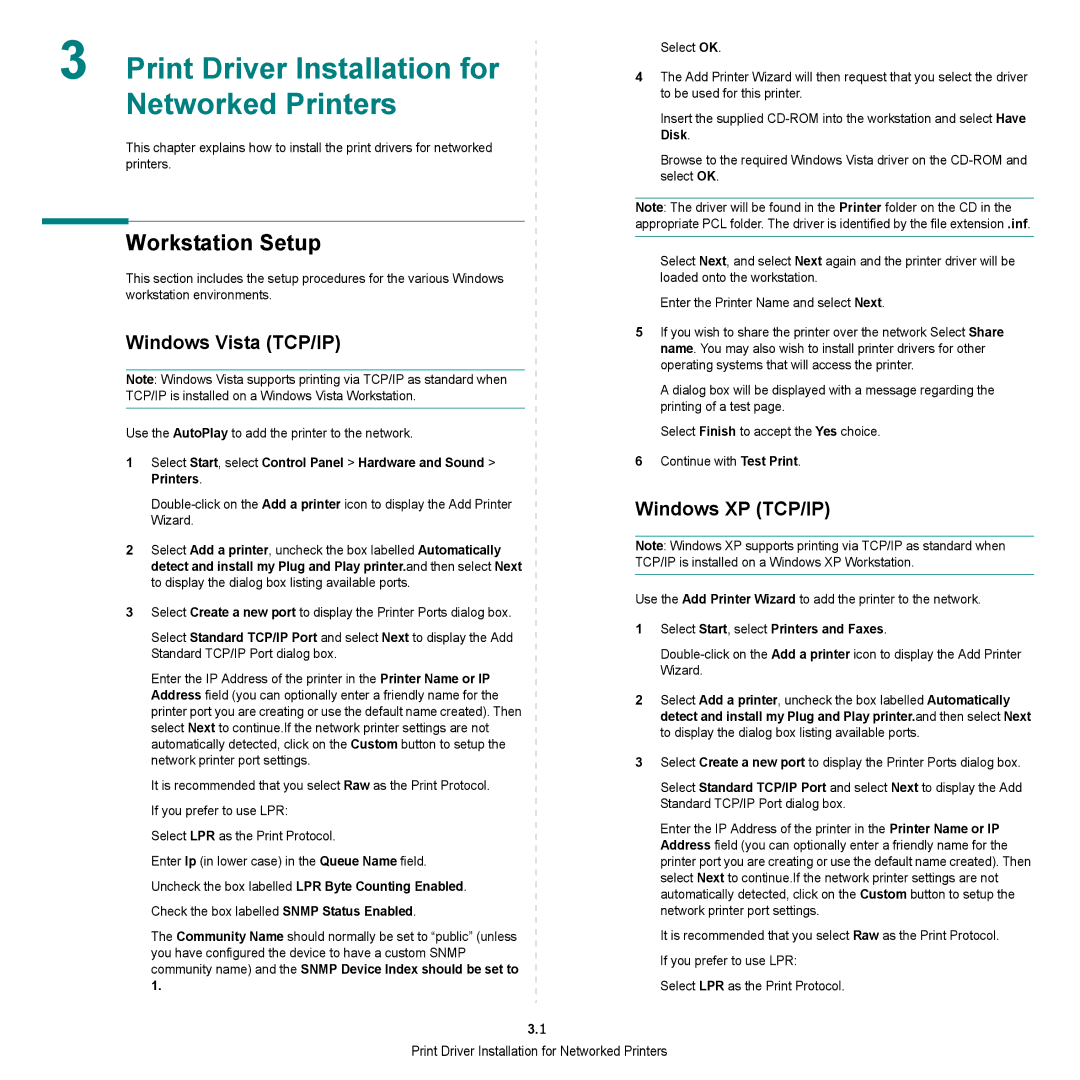
3 Print Driver Installation for Networked Printers
This chapter explains how to install the print drivers for networked printers.
Workstation Setup
This section includes the setup procedures for the various Windows workstation environments.
Windows Vista (TCP/IP)
Note: Windows Vista supports printing via TCP/IP as standard when TCP/IP is installed on a Windows Vista Workstation.
Use the AutoPlay to add the printer to the network.
1Select Start, select Control Panel > Hardware and Sound > Printers.
Select OK.
4The Add Printer Wizard will then request that you select the driver to be used for this printer.
Insert the supplied
Browse to the required Windows Vista driver on the
Note: The driver will be found in the Printer folder on the CD in the appropriate PCL folder. The driver is identified by the file extension .inf.
Select Next, and select Next again and the printer driver will be loaded onto the workstation.
Enter the Printer Name and select Next.
5If you wish to share the printer over the network Select Share name. You may also wish to install printer drivers for other operating systems that will access the printer.
A dialog box will be displayed with a message regarding the printing of a test page.
Select Finish to accept the Yes choice.
6Continue with Test Print.
2Select Add a printer, uncheck the box labelled Automatically detect and install my Plug and Play printer.and then select Next to display the dialog box listing available ports.
3Select Create a new port to display the Printer Ports dialog box.
Select Standard TCP/IP Port and select Next to display the Add Standard TCP/IP Port dialog box.
Enter the IP Address of the printer in the Printer Name or IP Address field (you can optionally enter a friendly name for the printer port you are creating or use the default name created). Then select Next to continue.If the network printer settings are not automatically detected, click on the Custom button to setup the network printer port settings.
It is recommended that you select Raw as the Print Protocol. If you prefer to use LPR:
Select LPR as the Print Protocol.
Enter lp (in lower case) in the Queue Name field. Uncheck the box labelled LPR Byte Counting Enabled. Check the box labelled SNMP Status Enabled.
The Community Name should normally be set to “public” (unless you have configured the device to have a custom SNMP community name) and the SNMP Device Index should be set to 1.
3.1
Windows XP (TCP/IP)
Note: Windows XP supports printing via TCP/IP as standard when TCP/IP is installed on a Windows XP Workstation.
Use the Add Printer Wizard to add the printer to the network.
1Select Start, select Printers and Faxes.
2Select Add a printer, uncheck the box labelled Automatically detect and install my Plug and Play printer.and then select Next to display the dialog box listing available ports.
3Select Create a new port to display the Printer Ports dialog box.
Select Standard TCP/IP Port and select Next to display the Add Standard TCP/IP Port dialog box.
Enter the IP Address of the printer in the Printer Name or IP Address field (you can optionally enter a friendly name for the printer port you are creating or use the default name created). Then select Next to continue.If the network printer settings are not automatically detected, click on the Custom button to setup the network printer port settings.
It is recommended that you select Raw as the Print Protocol. If you prefer to use LPR:
Select LPR as the Print Protocol.
